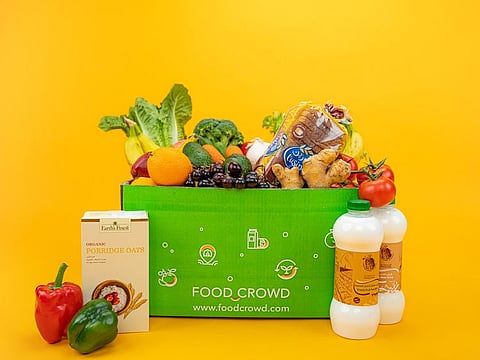Ancient and modern at UAE dining tables in 2021
This year’s food trends will see innovation sit alongside tradition

Highlight
From kosher preparation to food tech apps, the year’s food trends will see innovation sit alongside tradition in the Emirates. Expect a preview at Gulfood
Dubai and its sister emirates have been at the crossroads of food routes since ancient times, although it is better known today for its embrace of everything tech. Perhaps it’s fitting, then, that this year’s food trends reconcile ancient and traditional ways of eating with cutting-edge production processes and supply chains. Tradition and innovation sit cheek by jowl at UAE dining tables in 2021.
Without our knowing, it was emblematic of the new political relationship between the two countries. A few moments later, he texted me the announcement of normalisation.

Ahead of this year’s Gulfood, the world’s food and drink sourcing exhibition and the first in-person industry event in nearly a year, GN Focus rounds up of the trends for the year ahead.
The rise of kosher
Caterer Dr Elli Kriel realised kosher food was on the uptrend last summer, when an Emirati friend took delivery of a meal of hummus, a staple of both Israeli and Arabic dinner tables. “Without our knowing, it was emblematic of the new political relationship between the two countries. A few moments later, he texted me the announcement of normalisation,” the UAE resident says, referring to the Abraham Accords, the peace agreement between Israel and the UAE. “At that point, I knew demand for kosher food in the UAE would be forever changed!”
Since direct flights were launched between the two countries, some 50,000 Israeli tourists visited the UAE in the four months to December, Tourism Minister Orit Farkash-Hacohen said at a recent forum. Hotels and restaurants across the UAE are now serving up meals prepared according to ancient kosher traditions following advice from the Department of Culture and Tourism Abu Dhabi.
Elli’s Kosher Kitchen, Dr Kriel’s catering business, has already clocked a significant rise in revenue with Kosherati, its fusion of kosher and Emirati food. December sales from individuals rose 500 per cent, and three new revenue streams from hotel catering, tour groups and a restaurant, opened up for her. She will discuss the demand for kosher meals at Gulfood, which features workshops devoted to Kosher certification. “Internationally, kosher food is a big health trend. Because certification of products means that products are checked to ensure certain qualities and standards, there is a perception that they are healthier.”
How the UAE is eating local
Even as eating local has become more important in recent years and the pandemic has affected global supply chains, new farming technologies such as hydroponics, aeroponics, and aquaponics present an opportunity for the UAE to grow crops in the harsh desert climate. Dubai-based agritech venture Greener Crop, launched last year, aims to stimulate a new wave of desert farmers with hydroponic farm management services. Clients provide the land, while Greener Crop helps design and set up a container, indoor vertical, or greenhouse farm. It develops a crop strategy, sources growing supplies, and offers farm management services to manage operations from sowing to harvest. “Our mission is to provide farmers with the resources and support to run sustainable and profitable farms,” says founder Alexander Kappes, who now wants to expand the business across the Middle East and Africa.
The UAE is still in its early stages in the growth of its agricultural industry and Al Dahra has long been at its forefront.

Bringing fresh produce from local farms to UAE dining tables is Food Crowd, which will be showcased at Gulfood. Launched by Abu Dhabi-based agribusiness veteran Al Dahra Holding, the Emirati-owned farm-to-home app is one of several offering produce and grocery boxes packed with fruit, vegetables, fresh meat, dairy and pantry items to UAE residents. The app, which saw its year-on-year gross merchandise value rise 330 per cent in the second quarter of 2020, could help shore up demand for local agriculture, its founders believe. “The UAE is still in its early stages in the growth of its agricultural industry and Al Dahra has long been at its forefront,” Food Crowd founder Salmeen Al Ameeri said. “When we think approximately an economical, large scale farming industry, the Middle East may not be the first to come to mind, but thanks to expanded interest from communities and international companies, there is decided progress in overcoming nourishment and water scarcity issues. With imports accounting for 87 per cent of the UAE’s imports, a major change on the agricultural front is much needed.”
Tech to the rescue
Food tech start-ups are also changing how the hotel and restaurant sector connects with suppliers. SupplyMe, a new online B2B marketplace, streamlines the procurement process while improving the delivery and invoicing process with artificial intelligence. “Our application leverages machine learning technology and builds an extremely personalised experience for each and every customer signing up with us, thus providing consumerisation of the B2B experience,” says Igor Nikolenko, Co-founder & CEO, SupplyMe.
Our application leverages machine learning technology and builds an extremely personalised experience for each and every customer signing up with us, thus providing consumerisation of the B2B experience.

He insists foodtech start-ups will remain relevant in the post-Covid world, and that the F&B sector won’t revert to traditional supply chain models, citing 2020 McKinsey research that more than 75 per cent of B2B buyers say they prefer online purchases to traditional in-person contact. “The shift to digital is happening and will continue to evolve at a rapid pace. Covid-19 has just accelerated the process of digitalisation. With the advent of technology, B2B buyers are now looking for same offline experience they are used to in an online environment. In 2021, B2B brands are going to rethink its sales funnel to make sure they are meeting prospective clients where they are.”
Finding kosher ingredients on an app can’t be that far away in this brave new world, then.



